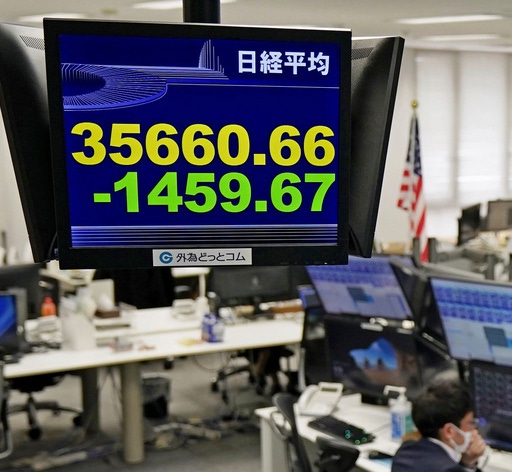NEW YORK (AP) — Asian shares were sharply lower on Monday after another wipeout slammed Wall Street as build about a potentially toxic mix of worsening inflation and a U.S. economy slowing because households are afraid to spend due to the trade war.
U.S. futures and oil prices were lower.
Thailand’s SET lost 0.9% after a powerful earthquake centered in Myanmar rattled the region, causing widespread destruction in the country, also known as Burma, and less damage in places like Bangkok, though a high-rise office building under construction collapsed.
Tokyo’s benchmark fell nearly 3.9% to 35,691.52, while the Hang Seng in Hong Kong lost 1% to 23,200.65.
The Shanghai Composite index declined 0.5% to 3,333.66.
In South Korea, the Kospi fell 2.6% to 2,492.49, while Australia’s S&P/ASX 200 sank 1.6% to 7,856.80.
Taiwan’s Taiex lost 3.4%.
On Friday, the S&P 500 dropped 2% to 5,580.94, for one of its worst days in the last two years. It was its fifth losing week in the last six.
The Dow Jones Industrial Average sank 715 points, or 1.7%, to 41,583.90, and the Nasdaq composite fell 2.7% to 17,322.99.
Lululemon Athletica led the market lower with a drop of 14.2%, even though the seller of athletic apparel reported a stronger profit for the latest quarter than analysts expected.
Oxford Industries, the company behind the Tommy Bahama and Lilly Pulitzer brands, likewise reported stronger results for the latest quarter than expected but still saw its stock fall 5.7%.
One of the main worries hitting Wall Street is that President Donald Trump’s escalating tariffs may cause U.S. households and businesses to freeze their spending. Even if the tariffs end up being less painful than feared, all the uncertainty may filter into changed behaviors that hurt the economy.
A report on Friday showed all types of U.S. consumers are getting more pessimistic about their future finances. Two out of three expect unemployment to worsen in the year ahead, according to a survey by the University of Michigan. That’s the highest reading since 2009, and it raises worries about a job market that’s been a linchpin keeping the U.S. economy solid.
A separate report also raised concerns after it showed a widely followed, underlying measure of inflation was a touch worse last month than economists expected.
The Fed could return to cutting interest rates, like it was doing late last year, in order to give the economy and financial markets a boost. But such cuts would also push upward on inflation, which has been sticking above the Fed’s 2% target.
The economy and job market have been holding up so far, but if they were to weaken while inflation stays high, it would produce a worst-case scenario called “stagflation.” Policy makers in Washington have few good tools to fix it.
Some of Wall Street’s sharpest losses on Friday hit companies that need customers feeling confident enough to spend, and not just on yoga wear or beach clothes. Delta Air Lines lost 5%. Casino operator Caesars Entertainment dropped 5%. Domino’s Pizza sank 5.1%.
The heaviest weights on the market were Apple, Microsoft and other Big Tech stocks, whose massive sizes give their movements more sway over indexes. They and other stocks that had gotten caught up in the frenzy around artificial-intelligence technology have been among the hardest hit in Wall Street’s recent sell-off.
Their prices had shot up so much more quickly than their already fast-growing revenues and profits that critics said they looked too expensive.
On the flip side, among the relatively few rising stocks on Wall Street were those that can make money almost regardless of what the economy does, such as utilities. American Water Works rose 2.2%.
Stock markets worldwide will likely remain shaky as an April 2 deadline approaches for more tariffs. That’s what Trump has called “Liberation Day,” when he will roll out tariffs tailored to each of the United States’ trading partners.
In other dealings early Monday, U.S. benchmark crude oil lost 40 cents to $68.96 per barrel. Brent crude oil fell 36 cents to $72.40 per barrel.
The U.S. dollar fell to 148.86 Japanese yen from 149.84 yen. The euro rose to $1.0838 from $1.0803.
___
AP Business Writers Stan Choe and Matt Ott contributed.
Copyright 2025 The Associated Press. All rights reserved. This material may not be published, broadcast, rewritten or redistributed without permission.
Asian shares are sharply lower after Wall Street tumbles WHEC.com.
Read More Details
Finally We wish PressBee provided you with enough information of ( Asian shares are sharply lower after Wall Street tumbles )
Also on site :
- Vacaville carjacking suspects arrested in Fairfield; suspect shot by police
- On the record: Hubbard
- ForexLive Asia-Pacific FX news wrap: Oil spike on talk of Israel preparing attack on Iran

